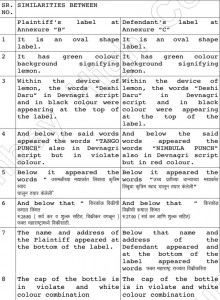H v. H
High Court of Bombay
Text of the judgement can be found here
The Bombay High Court recently refused to vacate an injunction granted to a country liquor distillery in a trademark and copyright dispute against another distiller for alleged infringement and passing off. In doing so, the court relied on Cadila to examine the similarities between the two labels. The court also observed that the appellate court was merely to examine whether the discretion of the lower court was improperly exercised, and only if so, could interfere with it.
Facts of the Case: The dispute was regarding a passing off claim between two manufacturers of country liquor with the appellants (defendants in the original suit) selling under the brand name “Nimbula Punch” and the respondents selling under the brand name “Tango Punch”. There was also a claim regarding infringement of copyright in the label used in the packaging. The lower court had observed such a case had in fact been made out and granted an injunction in favour of the plaintiffs. The appellants approach the court to vacate this injunction.
Contentions of the Parties: It is the case of the appellants that there are many dissimilarities (using S.M. Dyechem Ltd. v. Cadbury (India)) between the two labels and the two liquors have been made from different raw materials, which does not make them deceptively similar. They also argue that despite objections of the respondents the State Excise Commissioner had cleared the use of the label and that this would impart legality to its use.
The respondents argue that the labels must be viewed as a whole and a number of factors must be considered as laid down in Cadila Health Care Ltd. v. Cadila Pharmaceuticals Ltd.. Among these factors one is also to consider the consumer base of the product which is mainly made up of illiterate people of imperfect memory from the “lower strata of society”. They argue that the role of the Excise Commissioner was not to check for copyright and trademark violations. Any label approved the Commissioner would still be subject to a claim for these violations. The respondents also argue that the copyright in the artistic work on the label had been assigned to them by means of a deed of assignment which has not been denied by the appellants. Therefore as per S.14 (a) (i) of the Copyright Act, they had the exclusive right to convert it to label form.
The Question(s) before the Court: Since this was an appeal regarding the vacating of an injunction, the court essentially had to adjudicate on the question as to whether the Trial Court “exercised its discretion arbitrarily, or capriciously or perversely or where the Court had ignored the settled principles of law regulating grant or refusal of interlocutory injunctions”. To come to this conclusion, the court relied on the case of Wander Ltd. and Anr. v. Antox India P. Ltd. Observe that the question was not whether the label was in fact deceptively similar or not, this would be a question on appeal from the final determination of the suit.
Decision of the Court: The court in deciding in favour of the respondents concluded that there had been no illegality in the exercise of discretion by the Trial Court and that it had aptly concluded that the balance of convenience lay in the favour of the respondents. The injunction was not vacated therefore. The court also ordered that the final disposal of the suit be carried out expeditiously by the Trial Court.
Reasoning of the Court: The court agreed with the respondents’ case that despite the dissimilarities present in the label, the consumer base and similarities in the label need to be considered when determining the question of deceptive similarity.
 The court agreed with the identification of the similarities by the Trial Court and also observed that the consumer base was mostly composed of illiterate people with an imperfect memory. Therefore, applying the ratio of Cadila, the court ruled that the Trial Court had appropriately identified a possibility of deceptive similarity. The court noted that the Trial Court had appropriately identified that the respondents had a copyright in the artwork on the label as evidenced by the certificate of registration. In any case, the appellants had not denied this submission before the Trial Court in their Written Statements. The Court also seems to agree with the respondents that the decision of the Excise Commissioner would not prejudice the present case.
The court agreed with the identification of the similarities by the Trial Court and also observed that the consumer base was mostly composed of illiterate people with an imperfect memory. Therefore, applying the ratio of Cadila, the court ruled that the Trial Court had appropriately identified a possibility of deceptive similarity. The court noted that the Trial Court had appropriately identified that the respondents had a copyright in the artwork on the label as evidenced by the certificate of registration. In any case, the appellants had not denied this submission before the Trial Court in their Written Statements. The Court also seems to agree with the respondents that the decision of the Excise Commissioner would not prejudice the present case.
In recording these conclusions, the court also held that the discretion of the court was not exercised in an arbitrary or perverse manner. The court also went so far as to say that even if the merits of the case were to be considered, a case for deceptive similarity could be made out. The court also agreed that as the parties were involved in the sale of country liquor, there could not be an accurate estimate of the sale proceeds of the appellants, therefore the balance of convenience for the grant of an injection also lie in favour of the respondents.
